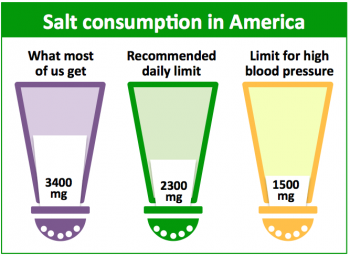Cleo Sutton isn’t asking someone to pass the salt as much as he used to, and he’s reaching for other way s to add flavor when he is doing the cooking.
s to add flavor when he is doing the cooking.
“The tenderizer I always used to make meat taste good is just too salty. It’s better to use things like Mrs. Dash,” he says. Cleo wants to learn more about healthy eating so he can talk more knowledgeably with friends and family about making changes that are good for them. He’ll soon be participating in Healthy Habits for Adults, a program offered by Oasis with support from Anthem Foundation.
Healthy Habits for Adults is a series of one-hour classes that focuses on achieving better health through improved nutrition and increased physical activity in older adults. By taking the classes, Cleo will gather all kinds of helpful information about better nutrition, including more facts about sodium in a “Shake the Salt” lesson.
Hold the salt, please
Sodium chloride or table salt is necessary for the human body to function properly as it controls fluid balance and the functioning of the muscles and nerves. If the body needs salt, why limit our intake? Research has shown that regularly consuming more than the recommended amount of salt per day can lead to high blood pressure, stroke, heart disease, kidney stones, headaches, weight gain and other health issues.
 Most Americans consume about 3400 mg of sodium per day.
Most Americans consume about 3400 mg of sodium per day.
The current dietary recommendation is to consume less than 2300 mg daily – about one teaspoon.
People who are at increased risk for high blood pressure should consume no more than 1500 mg a day – about three-quarters of a teaspoon.
The USDA at choosemyplate.gov has helpful hints to cut back on salt, including the following:
- Eat fresh foods which are generally lower in sodium than processed foods.
- Skip adding salt when cooking.
- Choose dairy and protein foods that are lower in sodium.
- Read the nutrition labels.
Information is the key to learning new habits. Other Healthy Habits classes include Love Your Colorful Fruits & Veggies, The Whole Truth About Whole Grains and several more topics.







Leave A Comment
You must be logged in to post a comment.